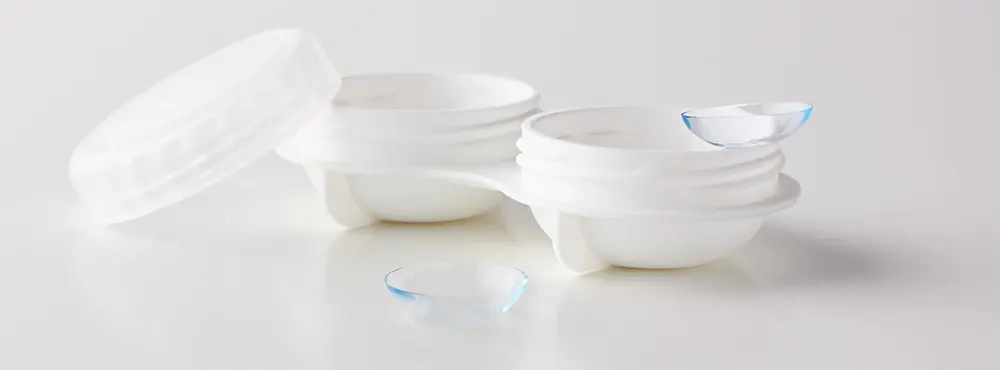As there are many different types of contact lenses, there are also many different wearing and replacement schedules. Each lens is designed for a specific length of wear.
For daily contact lenses, two weekly and monthly contact lenses, the time frames for replacing the lenses are simple and straightforward.
Daily disposable lenses should be thrown away after each single day of use. Two weekly and monthly disposable lenses, however, have a longer usage period. These reusable lenses must be cleaned and stored in fresh solution overnight and disposed of every two weeks and every month, respectively. All types of these lenses can be worn for around 12-14 hours continuously, but each brand and lens will have different recommendations. So, it is important to always check the packaging.
You can now get silicone hydrogel lenses for all these different types of contact lenses. Silicone hydrogel lenses are popular as they reduce your chances of getting hypoxia (oxygen deprivation) from lens wear.
You can also get soft contact lenses that last for a year as reusable lenses. The problem with these lenses is that they pose a higher risk of getting a bacterial eye infection known as Microbial Keratitis.
Harder gas permeable contact lenses are more resistant to lens deposits. They can last a year or more before they need to be replaced, provided that they are stored in fresh solution and are cleaned effectively.
What are extended wear contact lenses?
Extended wear contact lenses provide a bit more flexibility for the contact lens wearer in terms of the length of time they are worn for and how often they're replaced.
Some two weekly and monthly contact lenses offer the option to wear your lenses continuously for a limited period of time, usually up to seven days and six nights without removal. Some monthly lenses can be worn and slept in for up to 30 days and nights depending on the brand, whereas others are licensed for up to 7 nights. These are extended wear contact lenses and, if prescribed by your optician, they will allow you to enjoy the freedom of wearing your contacts day and night. This will save you the trouble of cleaning and storing them every night.
It’s important to remember that this practice reduces the life of your lenses. Therefore, you’ll only be able to enjoy the added convenience of continuous wear for a shorter amount of time in comparison to daily removal lenses.
Extended wear lenses should only be trialled under the supervision of your optician, who will need to approve you to wear extended wear contact lenses. It is important to schedule regular check-ups with your optician when you use these kinds of lenses, always follow your optician’s advice and take extra care.
How many hours a day should you wear contact lenses?
It’s always best to speak with your optician regarding how you use your contact lenses and how long you should wear them for. However, as general practice goes, you shouldn’t wear most contact lenses for longer than 12-14 hours a day on average.
The problems posed by wearing your contact lenses for too long include discomfort, drying of the eyes, blurred vision, redness of the eyes and increased chances of an eye infection. If you experience any of these problems, you should consult an eye care professional immediately.
What happens if I don't change my contact lenses every month?
Failing to replace your lenses when required can cause your cornea to swell, lead to corneal abrasion, dry eyes, red eyes and an overgrowth of blood vessels which in turn can cause irreparable damage to your cornea. You will also be at higher risk of contracting eye infections, that’s why it is so important to replace your lenses regularly as recommended. If you wear yearly contact lenses, then you don’t need to worry about replacing them every month, so long as they are cleaned and stored effectively and do not cause you any discomfort.
Quick links:
How to apply and remove your contact lenses
Contact lens care
How to clean a contact lens case
What should I do if my contact lenses hurt?
Disclaimer: The advice in this article is for informational purposes only and does not replace medical care or an in-person check-up. Please check with an eyecare professional before purchasing any products or remedies. For information on our article review process, please refer to our Editorial Policy.

 Offers
Offers Account
Account
 Favorite
Favorite
 Basket
Basket

 OFFERS
OFFERS















